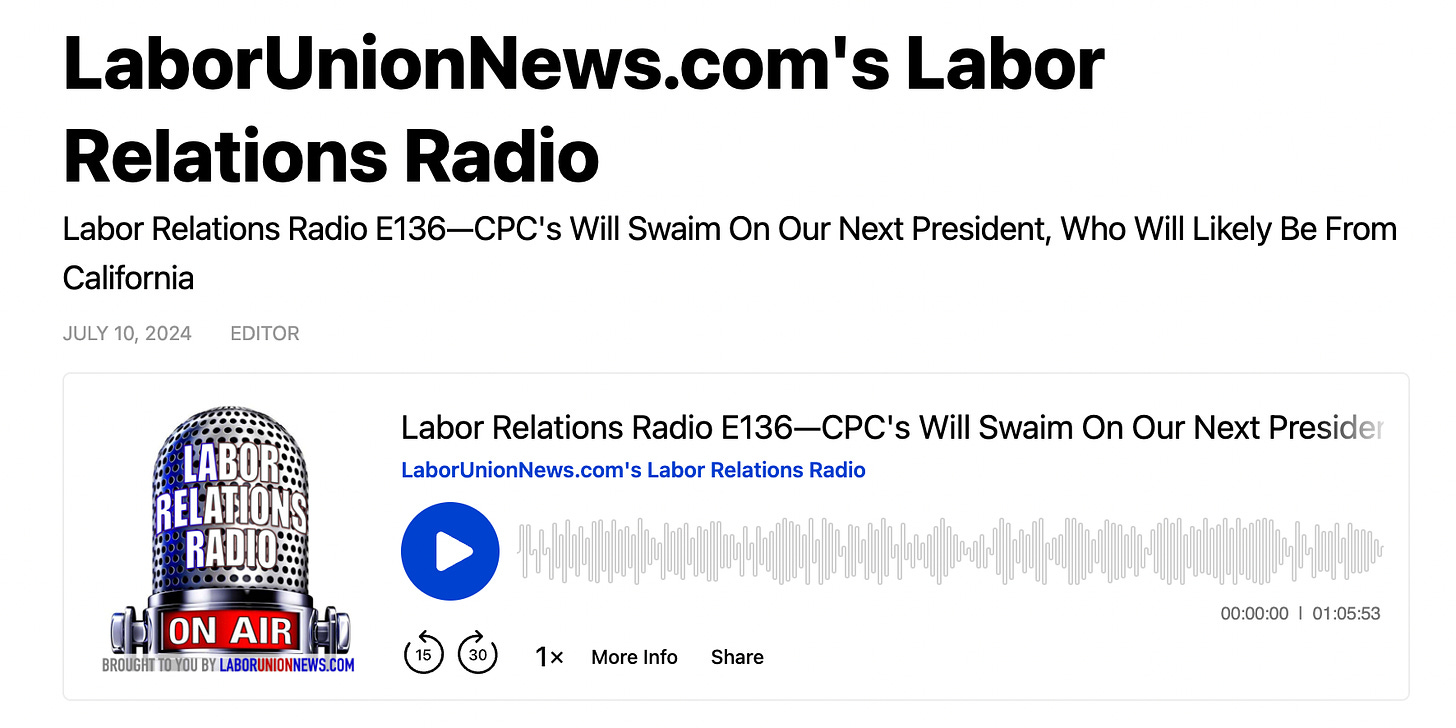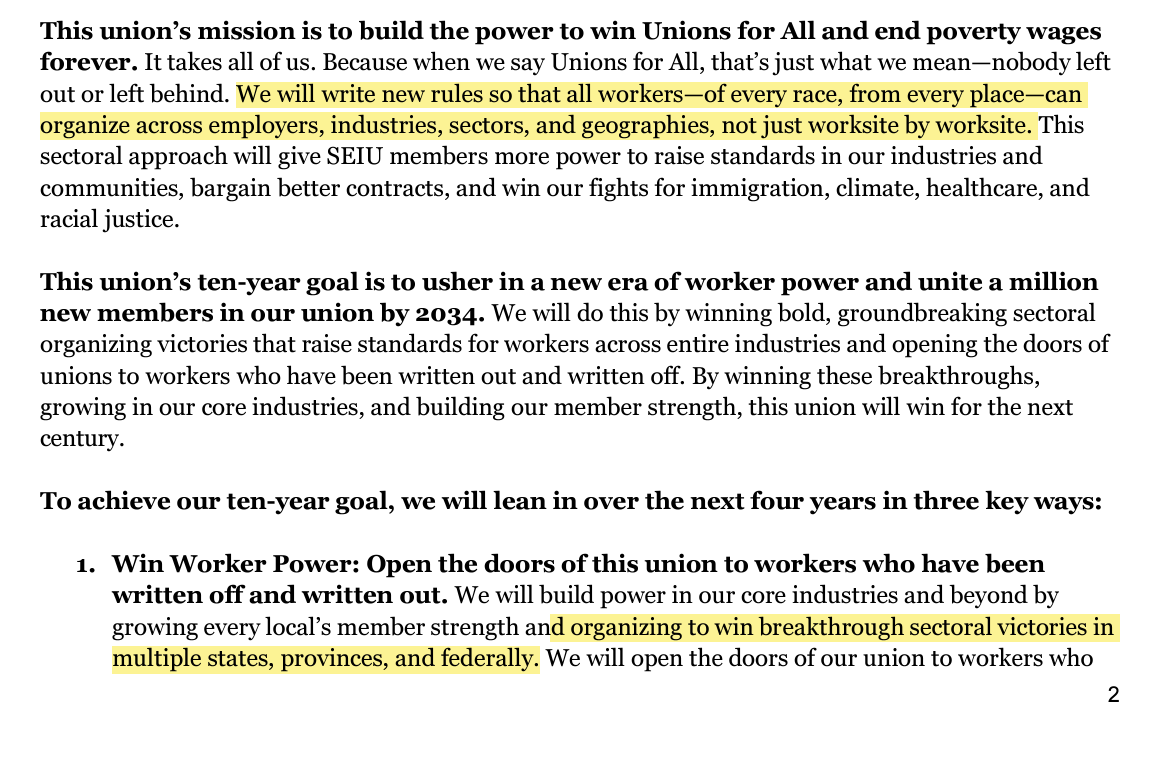We Need To Talk About Sectoral Organizing
Freelance busters are eerily enthusiastic about this idea, which they think they can achieve without reclassifying independent contractors as employees.
In late May, the SEIU—whose slogan is “Unions For All”—made an announcement that described something new to me:
“We will win bold, groundbreaking sectoral organizing victories that raise standards for workers and open the doors of unions to workers who have been written out and written off.”
Sectoral organizing. Not a term that was part of my vocabulary.
As it turns out, I was far from alone. I asked some top labor and employment lawyers about it. They told me that while sectoral organizing, or sectoral bargaining, is common in Europe, it’s rare in the United States. Google confirms they’re right.
This idea is getting a sort of test run right now in California, and independent contractors need to understand the concept.
As with California’s Assembly Bill 5—which kicked off the wave of freelance busting we have been enduring since about 2019—what we’re witnessing in California today is likely a model for the next wave we’ll be forced to fight all across the country.
The SEIU has particularly close ties to Vice President Kamala Harris, who supports freelance busting and is poised to be the Democratic Party’s presidential nominee. Just yesterday, Seth D. Harris, who was President Obama’s Secretary of Labor and formerly President Biden’s top labor-policy adviser, tweeted a column promoting sectoral organizing. U.S. Representative Pramila Jayapal, chairwoman of the Congressional Progressive Caucus, wrote in her book that sectoral organizing is needed to “counter corporate supremacy.”
On the other side of the aisle, where Republicans have traditionally stood squarely on the side of protecting independent contractors, newly nominated vice presidential candidate JD Vance seems to think sectoral organizing is a good idea, too. He’s talked about it more than once. Conservative think tank guys like Oren Cass are working hard in Washington, D.C., right now to spread this idea of “pro-worker conservatism.”
All of which means this next wave of freelance busting might happen no matter which party controls the government.
Same Goal, New Path
Under U.S. law, it’s illegal to unionize an independent contractor. We have the right to hang out a shingle and go into business for ourselves, to choose the path of self-employment, and to earn a living free from union interference.
This legal barrier has long frustrated unionists. They have been watching the rise in self-employed Americans, and comparing those ever-climbing highs to their own all-time membership lows. Union organizers want America’s laws changed so that independent contractors are no longer protected from them.
In recent years, this freelance-busting brigade has focused on trying to rewrite state and federal laws and regulations in ways that reclassify most or all of us as employees who are eligible for unionization. Where they have succeeded, such as with California’s Assembly Bill 5, they have destroyed independent contractors’ incomes and careers while gaining no lasting increase in union membership.
As a result, this form of freelance busting has faced not only bipartisan lawmaker resistance, but also strong public pushback—and rightfully so.
Thus, the unionists are seeking another option. They are signaling that their next attempt will be to achieve their goals through sectoral organizing.
What Is Sectoral Organizing?
As the lawyers explained it to me, this type of organizing is different from what we’re familiar with in the United States. Here, unions are legally required to organize only a single company at a time. They can’t unionize the whole auto industry at once; they first have to get employees at Ford to unionize, then go to Chevrolet, and so forth.
In legal lingo, unions have to focus their organizing efforts on a single enterprise.
With sectoral organizing, that limitation is removed. Unions could gain control over setting standards for entire industries—including ones where independent contractors do business, even without reclassifying us as employees. Union-backed lawmakers could give organizers control over, say, standards for the whole publishing industry. Suddenly, freelance writers would be caught up in their gill net, right alongside unionized and non-unionized employees.
“That sounds like the way drug cartels get power over entire regions or spheres of an economy,” I said to one of the attorneys. “They try to control everyone from the mules to the cooks to the street dealers.”
He replied that my comparison was apt. Sectoral organizing is cartel-level control in the hands of union organizers, backed by the power of the state.
The freelance-busting crowd is now signaling that it intends to push for this type of cartel organizing. Here’s how the SEIU described its plans a few months ago:
Attorney Alex MacDonald, writing in The Federalist in January, explained why this approach appeals to the freelance-busting brigade. His article focuses on a sectoral-organizing petition in Massachusetts that would cover app-based rideshare drivers—but as we have all learned the hard way, whenever the unionists say “Uber and Lyft,” they’ll ultimately come for us all.
These drivers in Massachusetts are independent contractors. As in California, they have thus far staved off union attempts to have the government reclassify them as employees against their will. MacDonald is writing about them, but the point he makes about sectoral organizing applies generally to every industry if cartel-type control becomes the norm:
“The enterprise model is the only real option for workers covered by the [National Labor Relations Act]. But that’s not necessarily true for workers falling outside the NLRA—which is where the SEIU’s petition comes in. Rideshare drivers are exempt from the NLRA because they are not ‘employees’; they’re independent contractors. And independent contractors are explicitly excluded from the NLRA’s coverage. So states theoretically have more leeway to regulate their working conditions. States can adopt a different system without worrying about preemption.”
Put into layman’s terms: cartel-style sectoral organizing is yet another possible form of freelance busting, if unionists can get lawmakers to go for it.
It’s not a fantastical idea. It’s getting a test run right now in California.
California’s Council
California is the state that gave us the reclassification nightmare of Assembly Bill 5. It went into effect in January 2020 and kicked off a wave of copycat bills in other states and at the federal level with the PRO Act. Grassroots and bipartisan opposition have blocked all these other reclassification bills from becoming law, at least so far—and rightly so, given how destructive AB5 has been to self-employed Californians.
Instead of acknowledging that mistake, in September 2023, California upped the ante. The state made a move toward sectoral organizing with Assembly Bill 1228.
Among other things, this law establishes a Fast Food Council. The council will set an hourly minimum wage for fast food restaurant employees, and will develop standards, rules and regulations for the fast food industry.
The SEIU called the day when Governor Gavin Newsom signed the bill into law “a watershed moment in the nation’s labor history.” The union did not say in California’s history. It said in nation’s history.
MacDonald, writing in The Federalist, calls the situation a “quasi-sectoral scheme.”
Earlier this month, the Labor Relations Radio podcast invited Will Swaim, president of the California Policy Center, to discuss how this council could ultimately give union organizers widespread access to non-union workers. Swaim and host Peter List start to talk about this around 29:30.
(Click the link in the caption to listen, or skip below for the key part of the transcript.)

Here’s how Swaim explains the way unions can benefit from this new Fast Food Council. Note how he mentions the freelance-busting law AB5 by comparison:
“Well, here's the hypothesis, and sometimes they say the quiet part out loud, the union leaders do, but the hypothesis is, the reigning hypothesis, both from the left and the right is, it's going to take a minute before that Fast Food Council says, ‘You know what would really make this even better? Everybody joins a union.’
And it's really going to be almost that explicit. Let's go back to the lesson of AB5: If we cannot unionize you independent truckers, we're going to make your work illegal.
So, hey, fast food restaurants, if you don't have a union operating here, there's just no way this council can possibly manage the minute labor details at every one of the tens of thousands of fast food stores. We can't do that. You've got to have a union with a shop floor steward in place. Very much like the Bolshevik idea of a commissar in your Red Army making sure the troops are following Marxist military theory.
So that is really the other shoe that has yet to drop. And I don't want to hold myself hostage to fortune, but I think that prediction makes a lot of sense. It just seems very likely, given how the California government unions operate and how the other labor unions operate in concert.”
If you think he’s paranoid, think again. Yes, the California Policy Center has been described as conservative and libertarian, but Swaim is saying the same thing as liberals who supported the creation of the Fast Food Council.
Larry Cohen sounded awfully similar to Swaim when writing last year in The Nation when the idea was part of California Assembly Bill 257. The Nation notes Cohen’s political credentials as a past president of the Communications Workers of America union, a board chair of the progressive group Our Revolution, and a member of the Democratic National Committee.
Cohen writes about the Fast Food Council beneath the headline, “Should the Labor Movement Prioritize the Push for Sectoral Bargaining?”:
“Such councils are not substitutes for unions, but they cut against the bifurcated workplaces with contractors, franchises and part-time workers.”
Cut against the bifurcated workplaces.
In other words, treat everyone essentially the same, regardless of laws that differentiate the way we earn a living now.
Independent contractors become more like unionizable employees.
That’s freelance busting.
California is Just the Start
A lot of us—actually, it’s fair to say, the majority of us—independent contractors had no idea what reclassification was until the legislation was bearing down upon us in California and New Jersey, and then in Washington, D.C.
Trying to fend off these freelance-busting attacks is a nightmare. Those of us who found ourselves caught in the crosshairs had to get a crash course in labor and employment law; create grassroots groups to defend our chosen careers; and go all the way to the U.S. Congress and the federal courts to protect our livelihoods.
Since all of that began around 2019, we’ve learned a lot. We know who’s in the freelance-busting brigade. We know their goal is to get around laws that protect us from them. We know they don’t care about what we want, which is to remain self-employed. We know they want to unionize as many of us as possible.
Most of all: We have learned to be wary whenever they try to roll a new Trojan horse into town, claiming that something none of us have ever heard of will “protect” us.
The Center for American Progress, a progressive think tank in Washington, D.C., is already talking about how getting a foothold through sectoral organizing could lead to more policies that benefit unions. In May, senior fellow David Madland wrote:
“[S]ectoral bargaining best fosters union membership when it operates in conjunction with grassroots organizing and other policies such as strong worker rights, union access to workers, and policies that incentivize membership. Therefore, policies to promote sectoral bargaining in the United States should be advanced together with other reforms.”
Imagine we’re back in 2019, when they were all excited about the idea of reclassifying us as employees. Think about how differently we could have fought off that threat to our livelihoods if we had understood what the freelance-busting crowd was doing from the start.
Consider a reality where, instead of being on constant defense, we could have gone on offense and insisted that lawmakers protect our right to choose self-employment against the specific policy initiative.
That’s where we are today with cartel-style sectoral organizing.
Politicians on both sides of the aisle need our votes to advance their careers. We must insist that they are clear about their position on freelance busting in general—and on the policies of reclassification and sectoral bargaining, in particular.





